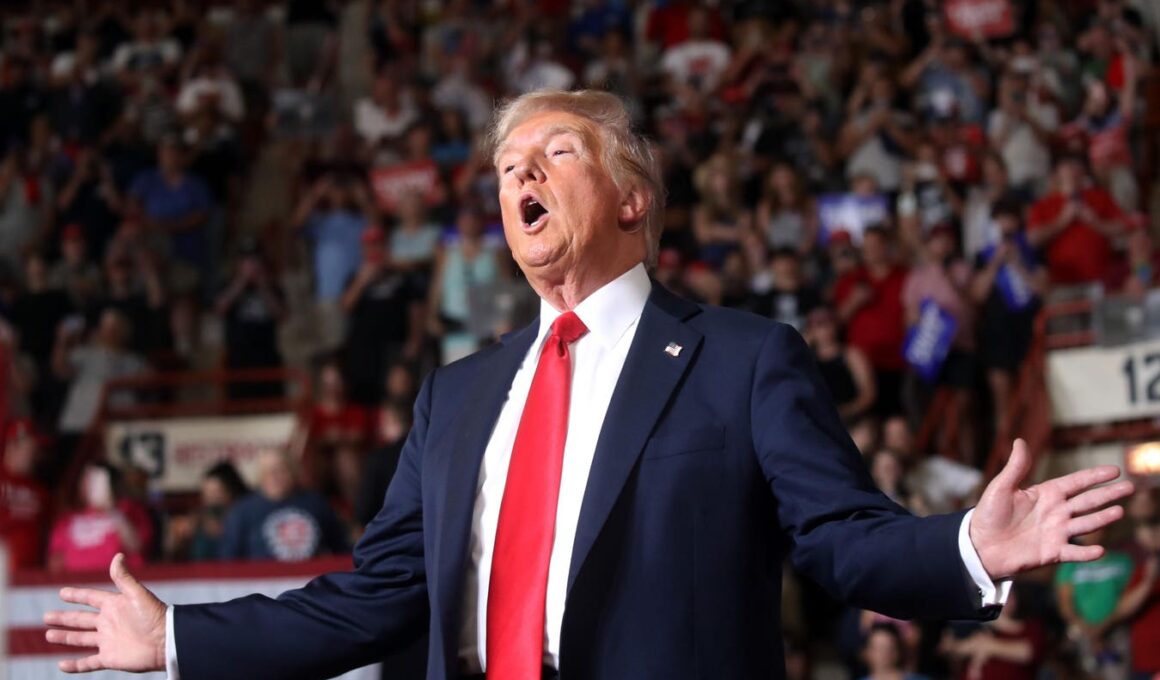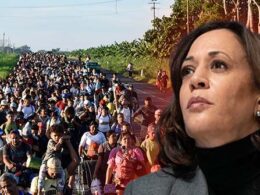Topline
Former President Donald Trump is amplifying and expanding on his controversial comments about Vice President Kamala Harris’ race—suggesting that because she acknowledges her Indian heritage, she can’t also be Black—despite immediate, bipartisan backlash to the initial statements on Wednesday.
Republican presidential nominee, former U.S. President Donald Trump speaks at a rally on July 31, … [+]
Key Facts
Trump on Thursday posted a photo to Truth Social of Harris with her mother’s side of the family wearing traditional Indian clothing that had been previously published by news outlets, sarcastically writing “thank you Kamala for the nice picture you sent from many years ago! Your warmth, friendship, and love of your Indian Heritage are very much appreciated.”
At Trump’s Pennsylvania rally on Wednesday—after his initial remarks questioning Harris’ race during an interview at the National Association of Black Journalists convention—his campaign featured a photo above the stage of a headline about Harris becoming the first Indian-American elected to the Senate.
Defending his statements in a Truth Social post, Trump falsely claimed “Crazy Kamala is saying she’s Indian, not Black. This is a big deal. Stone cold phony. She uses everybody, including her racial identity!” featuring a video of Harris cooking Indian food with Indian-American actress Mindy Kahling.
Harris, whose mother immigrated from South India and her father from Jamaica, has long acknowledged both sides of her heritage—in her 2019 memoir “The Truths We Hold,” Harris said her mother and maternal grandparents “instilled us with pride in our South Asian roots” and that her mother “understood very well that she was raising two Black daughters.”
Trump is doubling down on the comments despite instant condemnation—the NABJ audience gasped when he questioned whether Harris “became Black” on Wednesday, within minutes White House Press Secretary Karine Jean-Pierre called the statements “repulsive” and “insulting,” and a coalition of GOP lawmakers and pundits denounced the comments throughout the course of the evening.
Key Background
Trump on Wednesday questioned Harris’ race during a question and answer session at the National Association of Black Journalists conference. Trump alleged Harris “was Indian all the way then all of the sudden she made a turn and she became a Black person.” The comment was among a series of controversial statements Trump made during the combative interview, including calling himself the “best president for the Black population since Abraham Lincoln,” accusing Harris of allowing immigrants to take what he referred to as “Black jobs” and mispronouncing Harris’ first name.
Chief Critics
Some prominent Republicans rebuked Trump’s remarks. Sen. Josh Hawley, R-Mo., said it’s “not a great idea for either of the parties to be playing racial identity politics,” and Sen. Steve Danies, R-Mont., said the “better approach is to focus on [the]
policies of Kamala Harris,” Axios reported. Sen. Lisa Murkowski, R-Alaska, also pointed out to Axios the interview was among a recent series of what she called “very unfortunate” campaign errors, including resurfaced comments from Trump running mate, Sen. JD Vance, R-Ohio, criticizing childless Americans.
Key Background
Prominent Republicans Criticize Trump For Falsely Questioning Harris’ Race—As He Doubles Down (Forbes)
Trump Questions Kamala Harris’ Race: Claims She ‘Became A Black Person’ In Combative Interview (Forbes)
Trump Claims Kamala Harris Only Recently Identified As Black — Here’s Why That’s Not True (Forbes)
2022 midterms, 2024 presidential campaign, the January 6 House committee investigation, former House Speaker Kevin McCarthy’s historic ouster, the 2023 State of the Union Address, former President Donald Trump’s federal election interference and classified documents cases and his Manhattan hush money case. Dorn graduated in 2012 from the University of Dayton with a degree in journalism. Prior to joining Forbes, she covered New York City and state politics for the New York Post and City and State magazine. Follow her for updates and analysis on the 2024 presidential race, key Senate and House races and developments in Congress and at the White House.
“>








